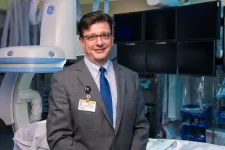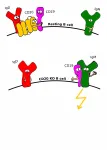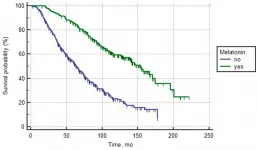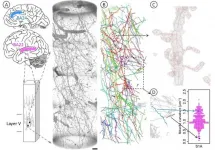Long-term stress linked to increased risk of heart attack
2021-02-10
(Press-News.org) Can long-term stress lead to heart attacks? Most people would probably answer in the affirmative, but the scientific evidence of this is scarce. A new study by researchers from Linköping University in Sweden reveals that the levels of the stress hormone cortisol were increased in the months preceding a heart attack. The results, published in Scientific Reports, suggest that long-term stress is a risk factor for heart attacks.
"The levels of the stress hormone cortisol differed between people who have had a heart attack and those not affected. This suggests that cortisol in hair may be a new risk marker for heart attacks. We must take stress seriously", says Professor Tomas Faresjö from the Department of Health, Medicine and Caring Sciences at Linköping University, principal investigator of the study.
Stress is a natural part of life today, but there is still a lot we don't know about the effects of long-term stress on our bodies. It is well-known that sudden emotional or physical stress, such as natural disasters or similar serious events, can trigger heart attacks. But what about long-term stress? It has been difficult to measure long-term stress due to a lack of reliable methods. The research group has improved the use of a new biomarker, in which they measure the levels of the stress hormone cortisol in hair. This enables measurements of cortisol levels backwards in time, similar to the growth rings in a tree. This analysis method is at the moment only available in research settings.
"If you ask someone who has suffered a heart attack whether they were stressed before the heart attack, many will answer yes. But that answer may be coloured by the cardiac event. We avoid this problem with our method, since we use a biological marker that can measure retrospectively, and objectively show stress levels in the months before the heart attack", says Tomas Faresjö.
In the present study, "Stressheart", the researchers used hair samples of length between 1 and 3 centimetres, corresponding to 1-3 months of hair growth. They measured cortisol levels in hair samples from 174 men and women in professional life who had been admitted for myocardial infarction to cardiology clinics in south-eastern Sweden. As control group, the researchers used hair samples from more than 3,000 similarly aged participants in the Swedish SCAPIS study (Swedish CardioPulmonary bioImage Study).
The researchers showed that patients who suffered a heart attack had statistically significant higher levels of cortisol during the month preceding the event. They adjusted for other established cardiovascular risk factors, such as high blood pressure, high levels of blood lipids, smoking, a history of heart attacks, hereditary for heart attacks, and diabetes, and found that high cortisol level remained a strong risk factor for heart attack.
"It's surprising that this biomarker for long-term stress seems to be strong even compared with traditional cardiovascular risk factors", says Tomas Faresjö.
A heart attack is damage to the heart muscle due to lack of oxygen supply to a part of the heart. Most often a blood clot forms that prevents blood from flowing through the coronary arteries that supply oxygen-rich blood to the heart. The underlying cause of most heart attacks is atherosclerosis (hardening of the arteries). This can start to arise decades before the first symptoms appear. An important question is whether, and if so how, long-term stress and atherosclerosis are associated.
"We will further investigate mechanisms that can explain how stress levels affect the risk of heart attack. We are particularly interested in various inflammation markers and calcifications in the blood vessels. We want to investigate whether these are related to long-term stress", says Susanna Strömberg, general practitioner and doctoral student in the Department of Health, Medicine and Caring Sciences at Linköping University.
The researchers cannot fully explain what causes the high cortisol levels seen in participants in the study. This is due to the fact that stress can be a result of either internal factors, such as another disease, or external factors, such as economic difficulties or major life events. They point out that the experience of stress does not always match the biological stress. An individual can feel stressed, without having any objective measures of stress. And the opposite can also be true: the body's stress systems can be highly active even though the individual does not feel stressed.
INFORMATION:
The study has received financial support from AFA Insurance.
The article: "Elevated levels of cortisol in hair precede acute myocardial infarction", Tomas Faresjö, Susanna Strömberg, Mike Jones, Andreas Stomby, Jan Erik Karlsson, Carl Johan Östgren, Åshild Faresjö and Elvar Theodorsson, Scientific Reports, published 31 December 2020, doi: https://doi.org/10.1038/s41598-020-80559-9
[Attachments] See images for this press release:

ELSE PRESS RELEASES FROM THIS DATE:
2021-02-10
Ruptured abdominal aortic aneurysms (rAAA) are responsible for nearly 2% of all deaths in U.S. men over the age of 65. Endovascular aneurysm repair (EVAR) has emerged as a newer and less invasive alternative to open repair for rAAA, and current guidelines recommend EVAR as a first-line option for treatment of rAAA when certain criteria are met. But researchers from the University of Missouri School of Medicine have discovered that while EVAR is more commonly utilized for rAA, shortens hospital stay and has a lower initial mortality rate, the odds of ...
2021-02-10
Researchers at the RIKEN Center for Biosystems Dynamics Research in Japan have discovered a recipe for continuous cyclical regeneration of cultured hair follicles from hair follicle stem cells.
Scientists have been making waves in recent years by developing ways to grow a variety of useful items in laboratories, from meat and diamonds to retinas and other organoids. At the RIKEN Center for Biosystems Dynamics Research in Japan, a team led by Takashi Tsuji has been working on ways to regenerate lost hair from stem cells. In an important step, a new study identifies a population of hair follicle stem cells in the skin and a recipe for normal cyclical regeneration in the lab.
The researchers took fur and whisker cells ...
2021-02-10
Experts from the Natural History Museum, The Francis Crick Institute and the Max Planck Institute for the Science of Human History Jena have joined together to untangle the different meanings of ancestry in the evolution of our species Homo sapiens.
Most of us are fascinated by our ancestry, and by extension the ancestry of the human species. We regularly see headlines like 'New human ancestor discovered' or 'New fossil changes everything we thought about our ancestry', and yet the meanings of words like ancestor and ancestry are rarely discussed in detail. In the new paper, published in Nature, experts review our current understanding of how modern human ancestry around the globe can be traced into the distant ...
2021-02-10
MINNEAPOLIS/ST.PAUL (02/10/2021) -- University of Minnesota Medical School researchers studied SARS-CoV-2 infections at individual cellular levels and made four major discoveries about the virus, including one that validates the effectiveness of remdesivir - an FDA-approved antiviral drug - as a form of treatment for severe COVID-19 disease.
"Since the start of the COVID-19 pandemic, the way that each individual responds differently to the infection has been closely studied. In our new study, we examined variations in the way individual cells reacted differently to the coronavirus and responded to antiviral treatment," said Ryan Langlois, PhD, senior author of the study, associate professor in the Department ...
2021-02-10
PHILADELPHIA -- Past exposure to seasonal coronaviruses (CoVs), which cause the common cold, does not result in the production of antibodies that protect against the novel coronavirus SARS-CoV-2, according to a study led by Scott Hensley, PhD, an associate professor of Microbiology at the Perelman School of Medicine at the University of Pennsylvania.
Prior studies have suggested that recent exposure to seasonal CoVs protects against SARS-CoV-2, the virus that causes COVID-19. However, research from Hensley's team, published in Cell, suggests that if there is such protection, it does not come from antibodies.
"We found that many people possessed antibodies that could bind to SARS-CoV-2 before the pandemic, but these antibodies could not prevent infections," Hensley said. ...
2021-02-10
Researchers from the University of Basel have developed a virtual reality app for smartphones to reduce fear of heights. Now, they have conducted a clinical trial to study its efficacy. Trial participants who spent a total of four hours training with the app at home showed an improvement in their ability to handle real height situations.
Fear of heights is a widespread phenomenon. Approximately 5% of the general population experiences a debilitating level of discomfort in height situations. However, the people affected rarely take advantage of the available treatment options, such as exposure therapy, which involves putting the person in the anxiety-causing situation under the guidance of a professional. On the one hand, people ...
2021-02-10
Rituximab, an anti-cancer drug targeting the membrane protein CD20, was the first approved therapeutic antibody against B tumor cells. Immunologists at the University of Freiburg have now solved a mystery about how it works. A team headed by Professor Dr. Michael Reth used cell cultures, healthy cells, and cells from cancer patients to investigate how CD20 organizes the nanostructures on the B cell membrane. If the protein is missing or Rituximab binds to it, the organization of the B cell surface changes. The resting B cell is activated in the process. The team has published the research in the journal PNAS as part of contributions by new members of the National Academy of Science.
B cells are white blood cells and part of the immune system. When they recognize ...
2021-02-10
Oncotarget recently published "Melatonin increases overall survival of prostate cancer patients with poor prognosis after combined hormone radiation treatment" which reported that a retrospective study included 955 patients of various stages of prostate cancer who received combined hormone radiation treatment from 2000 to 2019. Comprehensive statistical methods were used to analyze the overall survival rate of PCa patients treated with melatonin in various prognosis groups.
The overall survival rate of PCa patients with favorable and intermediate prognoses treated or not treated ...
2021-02-10
JACKSONVILLE, Fla. (February 10, 2021) - Brain volume, verbal IQ, and overall IQ are lower in children with Type 1 diabetes (T1D) than in children without diabetes, according to a new longitudinal study published in Diabetes Care, a journal of the American Diabetes Association. The nearly eight-year study, led by Nelly Mauras, MD, a clinical research scientist at Nemours Children's Health System in Jacksonville, Florida, and Allan Reiss MD, a Professor at the Stanford University School of Medicine in California, compared brain scans of young children who have T1D with those of non-diabetic children to assess the extent to which glycemic exposure may adversely affect the ...
2021-02-10
It was reported that volume of the brain areas such as superior temporal gyrus and anterior cingulate cortex reduces in schizophrenia but precise change of three-dimensional structure of neuron has remains unclear.
Dr. Itokawa and colleague performed Nanotomography experiments using Fresnel zone plate optics at the BL37XU beamline of the SPring-8 synchrotron radiation facility and at the 32-ID beamline of the Advanced Photon Source (APS) of Argonne National Laboratory.
A total of 34 three-dimensional image datasets of layer V of the BA22 cortex were blinded ...
LAST 30 PRESS RELEASES:
[Press-News.org] Long-term stress linked to increased risk of heart attack







